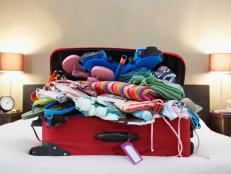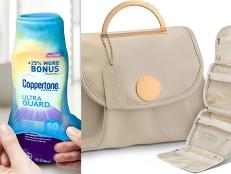Is It Safe to Drink the Water in Foreign Countries?
The oft-repeated advice for Americans traveling abroad might help you avoid illness, but the science behind it is less than definitive.

©iStockphoto.com/naumoid
On my first trip to Mexico, I woke up in the middle of the night to use the bathroom in my hotel room in Guadalajara. Half-conscious and thirsty, I turned on the sink, filled a glass of water and chugged half of it — then I realized what I’d done. I just drank the water. That’s the one thing everybody tells you not to do in Mexico! I spent the next two days terrified of the intestinal consequences...of which there were, thankfully, none.
If you’re an American planning a trip to someplace like Mexico or India, you’re going to hear more than one horror story about “Montezuma’s revenge” or “Delhi belly” and advice to treat taps like they’re toxic, keep your mouth closed in the shower, brush your teeth with bottled water and eschew ice in all forms.
I’ve had the opposite experience: In the years since my Guadalajara scare, I’ve drank from the tap in Guatemala, Taiwan and Mexico City, with no ill effects. But then again, one writer’s personal experience doesn’t constitute convincing scientific evidence. A strict prohibition on drinking the water when visiting many parts of the world for Americans is ubiquitous in travel guides and on social media, but is it merited?

I called up a scientist to find out. Dr. Louise Ivers is a physician, executive director of the Center for Global Health at Massachusetts General Hospital and a professor in the Global Health & Social Medicine department at Harvard Medical School. She’s trained in infectious diseases, tropical medicine and public health and lived in Haiti for a decade running health systems and working to combat water-borne cholera.
Ivers leads with a pretty shocking statistic: Between 30 and 70 percent of travelers suffer from traveler’s diarrhea, making it “the most predictable travel-related illness,” according to the Yellow Book, the Centers for Disease Control’s official reference book for travel medicine practitioners.
That sounds really scary, but the reality is not quite as terrifying. “What people always read about in the papers is the very dramatic cases, like the guy with the five-foot tapeworm,” Ivers says, but “the majority of people are having mild or moderate infections.” The CDC defines mild traveler’s diarrhea as a case that doesn’t affect travel plans at all and moderate as one that affects travel plans but isn’t completely incapacitating — it might require some over-the-counter medicine or a clinic visit, but not hospitalization.
“It also depends very much about where you go, the time of year, how long you stay and where you stay,” Ivers explains. The Yellow Book lists a low risk of traveler’s diarrhea for people visiting the US, Canada, Australia, New Zealand, Japan and most of Europe, and a high risk for those visiting most of Asia, the Middle East, Africa, Mexico and Central and South America.
The Best Way to Explore Mexico City? Pick a Neighborhood
Travelers are flocking to this bustling city and it's easy to see why.
But will strictly avoiding tap water and ice actually prevent a traveler from getting sick? That’s a much more complicated question. Ivers can rattle off a list of two dozen different bacteria, viruses and parasites that are responsible for illness in travelers, each of which takes a different amount of time to cause symptoms. Depending on what’s causing them, symptoms of water-borne illness can take anywhere from 12 hours to two weeks after exposure to develop. “It’s almost impossible for us as individual practitioners” to trace an individual’s symptoms to a particular food or drink, Ivers says. “Even myself, when I get sick, I’m always blaming specific things, but it can be really hard to trace it to something.”
And the reality is that food is probably a more common cause of illness in travelers than water. According to the Yellow Book, “poor hygiene practice in local restaurants is likely the largest contributor to the risk for traveler’s diarrhea.” Even if you do manage to avoid tap water entirely, you can’t really travel abroad without eating. “The old advice was ‘boil it or peel it or forget it,’” Ivers says. “But even with that advice, some people will get sick. We can’t trace every hand to every apple to every glass to every sink.”
It’s not all bad news, though. According to a 2017 World Health Organization/UNICEF report, a full 71 percent of the world’s population has access to “safely managed” drinking water, which means it’s free from contamination and kept separate from sewage. “For most Americans who are going on vacation or business for travel, the risks are small,” Ivers says. And even those who do get a little sick won’t see any ill effects in the long term: “If you’re otherwise a healthy adult who has a couple days of diarrhea, it won’t really affect your trip,” she explains. (Young children and those with compromised immune systems are at higher risk of complications, however.)
Ivers is a frequent traveler, often to places where unsafe water is an issue, and so she is far from cavalier about water herself. “I would never recommend anyone drink water from a tap in Haiti. Even though the risk of cholera is much lower than a few years ago, it’s still a risk. Don’t even take that risk on,” she says. Ivers sticks to bottled water in places like Haiti, but she’s also not completely fanatical. “I will usually brush my teeth with bottled water, but sometimes you inevitably forget, and it’s not the end of the world.”
The truth is that there’s no way to completely eliminate the risk of getting sick while traveling. But Ivers has a few pieces of advice: “Even if you’re traveling to a ‘tourist’ destination, there’s no guarantee that the water coming out of the tap has been treated. You might ask at the hotel or restaurant if the water’s treated and how’s the water treated before you decide to drink it. Be cautious of where and what you’re eating. Make sure it’s properly heated and cooked, and that the hands that are cooking it are clean.” And one modern convenience comes in especially handy, she says: “Hand sanitizer has been a wonderful addition to the toolkit!”

©iStockphoto.com/Joe_Potato
So why does this advice apply to international travel but not domestic? Why don’t people from, say, Dallas, get sick from the tap water when they visit Miami? “It’s probably a privilege we under-appreciate that we have reliable safe water in the US. Everything has to meet a very strict standard for drinking,” Ivers says. “Unless those systems break down — like in Flint, Michigan — we can turn on the tap and there’s safe water coming out no matter where you go. When you see a boil-water advisory, for example, that’s because the water is constantly monitored for safety in the first place!”
All in all, it is probably best for Americans to avoid tap water when traveling to certain areas. (Check the CDC’s list for country-by-country recommendations.) But if you accidentally swallow some in the shower, or while brushing your teeth, or while half-asleep on your first night in Mexico, it’s definitely not the end of the world. And the fact that you maybe shouldn’t drink the tap water is a bad reason not to visit a place.
(A caveat: Water-borne illness is a huge problem around the world, and nothing in this story about the risks for a typical American traveling abroad should take away from that. Millions of people suffer from diseases transmitted via water, and they kill around 500,000 children under 5 every year, making them the fourth-leading cause of death in that age range. Among the many charities supporting clean water worldwide, Louise Ivers’ Center for Global Health has water programs in Haiti, Bangladesh and Uganda you can support with a donation.)
























.jpg.rend.hgtvcom.231.174.suffix/1674758726773.jpeg)











